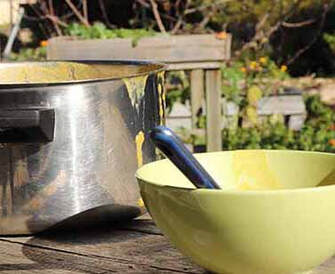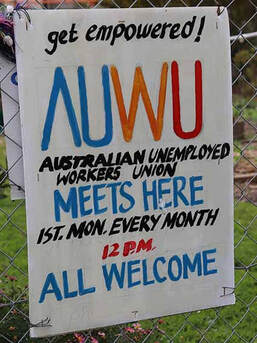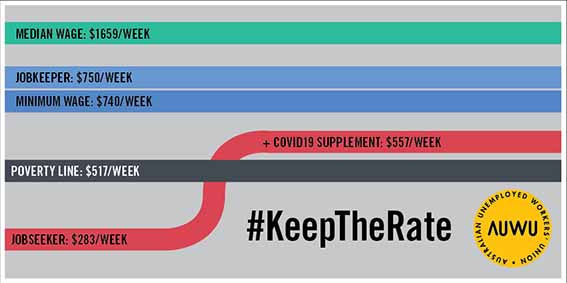 Photo: Geoff Ellis
Photo: Geoff Ellis
JESSICA Harrison lives in Wonthaggi where it’s hard to find jobs at the best of times. She has received countless knockbacks from potential employers as she struggles along on $277 a week. She’s 65.
Jess considers herself lucky. “This is a beautiful place and I have lots of friends who take care of each other. It’s still tough at times. You get a knot in the stomach when you've spent too much on food.”
If every cent goes on essentials, common place food items become unaffordable luxuries. One time a shopper behind her at the checkout paid for an item that broke Jess’s budget.
Normally half her weekly income goes to her mortgage so the temporary increase has given her some options. “The house repairs you just put off for a long time. I was going to get my car serviced but the engine just died, so I am saving for a big bill.”
Julie Tyrell had her first haircut in six months when the initial extra $270 arrived. She got a tyre repaired and filled her car’s petrol tank so she was mobile again. A shopping trolley full of specials helped restock her depleted pantry. The extra money enabled her to buy some small gifts for family members, including a nice linen shirt that will last for years and some baby clothes.
“It’s more like a normal life,” she says, “but I’m trying to put money aside for the day when the increase is taken away. Then I’ll have to go back to living on Aldi noodles and tuna.”
 Members of the Australian Unemployed Workers Union meet at the Harvest Centre in Wonthaggi each month. New members are welcome.
Members of the Australian Unemployed Workers Union meet at the Harvest Centre in Wonthaggi each month. New members are welcome. During the COVID-19 isolation period the Commonwealth also removed the obligation on JobSeeker beneficiaries to apply for jobs, attend agency interviews or perform volunteer duties at charities and not-for-profitss. This eased another burden for our local people – having to explain why they aren’t getting interviews and undertaking training for jobs that aren’t there. This usually involves travelling to another town, sometimes to the other end of the shire.
The tyranny of distance disadvantages long term jobseekers in rural areas. Mark Lanyon lives in Foster and has to travel to Leongatha for regular interviews with his job agency. He also needs to be ready to drive to other towns, such as Wonthaggi, to look for work.
With the extra money, he’s bought new door seals for his car so that he can stop the dust seeping into the cabin. He’s also restocked the pantry and paid off some debts.
Other recipients have been doing similar things with the increased money. New clothes, reconnection to the net, stocking the cupboards or enjoying the luxury of a take away coffee are respite from the days of running on empty or mentally adding the cost of each item as it goes into the bare supermarket trolleys.
To keep her car on the road and top up the shopping trolley over the last ten years Jess has supplemented that $277 a week of Newstart allowance with income from a series of casual jobs. But this part-time work has a catch – every dollar you earn per week, after the first $50, reduces your payment by 60 cents in the dollar. And you have to add in the cost of travel to where the jobs are.
Recipients have to report this income and calculations for benefit variations are made somewhere on the not quite dark web. Last year Jess was one of many locals who were given a hefty bill to repay when ‘averaging’ was applied to reported income. This came with a demand for immediate payment under threat of having her benefit payment stopped.
Jess had to ask her employer to provide an entire year of pay slips to prove that her top ups from Centrelink were merited. After a lot of stress and worry she actually received a small payment due to a miscalculation from several years ago.
Many people who were already struggling buckled and paid what they could, when they could. Others fought the debts at great personal cost, with allegations of suicides due to the demands for payment. Last month, the Government announced the so-called Robo-debt initiative had been scrapped. All the money is being refunded though no apology is forthcoming.
“It was very stressful,” says Jessica, “but I realised I was, like many, a victim of a heartless scheme of an evil genius in the government to extract money from the poorest people in our society. I had advice from the Australian Unemployed Workers Union and other welfare agencies. However, I did enjoy myself when I dressed up as a Robodebt Dalek at one of the unemployed rallies in the city!”
Having survived years below the poverty line and the imposition of fake debt, our long-term unemployed are able to breathe a little easier, for a few months at least. Life above the poverty line is only temporary, the Government has stated.
Poverty Day (September 27, 2020) approaches. This is the day when Newstart will revert to $279 a week for a single person. That old rate hasn’t been raised since petrol was 65 cents a litre.
For our friends and neighbours, this will mean a return to driving on empty and counting the cents in the checkout queue. Or staying in bed to keep warm as the cost of electricity rises. Or dumpster diving between visits to the food bank. Or hoping the toothache is gum disease so it can be relieved for free at the Emergency Department. Or taking in a boarder. Or becoming homeless.
Successive governments have branded our unemployed as leaners rather than lifters. One of the shocks – and lessons – of COVID-19 was that any one of us could suddenly become unemployed through no fault of our own. People who thought they were secure are now in need of hardship provisions. We're all in this together if the politicians and the media allow us to be a supportive society.
The Unemployed Workers Union and ACCOSS are both mounting campaigns to retain the current rate. A week of action is planned for August. Watch this space.
Geoff Ellis is a member of the Australian Unemployed Workers Union.
